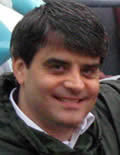
Joe Paterno, suddenly and categorically no longer the patron saint of college football coaches, deserves his fate. His reputation depended entirely on the idea of his moral clarity in his sport’s cloud of dust. “Success with honor,” he called it. Now he’s gone, and with him any sense of success or honor in the program he ruled for decades. It has to be that stark.
Faced with the most unambiguous choice possible between right and wrong, he — along with those above and below him on the org chart—decided not to act honorably but to preserve an illusion of honor. That’s now Paterno’s ultimate legacy, as a cautionary icon for a sport whose legends have always been more clay-footed than we—or they—were willing to believe.
- Related article
- Unbalanced: Penn State, sex abuse and me
I’d like to say I would have done more in the same situation, but I can’t. I can’t because a college football program’s “too big to fail” self-regard, which NCAA president Mark Emmert mentioned in announcing Penn State’s debilitating sanctions, might have cowed me just as much.
It’s a familiar pattern repeated in similar circumstances far beyond Penn State, far beyond sports. Police, soldiers, priests, politicians—human beings—we all align ourselves with institutions that come to define us. To acknowledge flaws in them, and especially to be the person exposing them, feels like a betrayal worse than the original misconduct. Every Notre Dame graduate signed an honor code before tests, but how many among us would have singled out a cheater for punishment? There is unspoken, but understood, dishonor in that.
There is also danger, which increases as institutions become more insular. Major college athletic programs walk that thin line everyday—involving issues that, as a rule, are mercifully less grave than Penn State’s, but with the same confusion between ends and means. Collective effort creates a sense of pride and sacrifice. The only thing we seem unwilling to sacrifice is our pride in the institutions themselves. But that predisposition makes hollow platitudes—as opposed to meaningful aspirations—out of an organization’s values.
The ideals that drew people to Paterno and Penn State had become inextricably linked to the program’s perception, not its reality. That disconnection created an institutional mindset that put protecting a reputation—an act that, in and of itself, made the program unworthy of its reputation—above protecting abused children.
The beatified likes of Paterno are supposed to distinguish the honest side of the line of scrimmage in the scrum of contradictory pressures and interests. I don’t think it’s a misrepresentation to say Paterno considered himself a teacher of that distinction as much as football itself. He certainly considered himself a teacher, to him a higher calling than coach. Yet even Mike McQueary, a former Penn State starting quarterback, captain and assistant coach—an honor student in Professor Paterno’s class—failed his ultimate test. A witness to Jerry Sandusky’s child sexual abuse, McQueary did exactly what Paterno did, fulfilling his most basic legal obligation, then turning away.
Forget the moral issue for a moment. How is it possible that leaders of an organization considered so virtuous would fail, even out of pure self-interest, to root out such evil? Because the program—and the university it fed—had become more important than the ideals they purported to represent. That’s the peril of “too big to fail,” the sense that success itself bestows honor.
Paterno succumbed to that belief, denying to his dying day that he knew the truth about his predatory ex-assistant, whose crimes he ignored with an instinct for self-preservation that erased his success and his honor. It’s an ugly legacy, but an important lesson that all of us could stand to learn.
Jason Kelly, a former sports columnist for the South Bend Tribune, is an associate editor of the University of Chicago Magazine. His most recent book is Shelby’s Folly: Jack Dempsey, Doc Kearns, and the Shakedown of a Montana Boomtown. Email him at jasonakelly545@gmail.com.